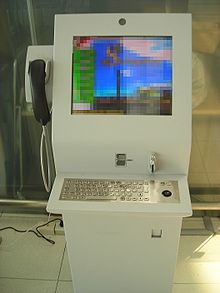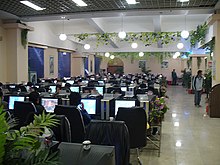Internet access


An Internet connection (also Internet connection , Internet connection ) generally refers to the communication link between a computer or a network and the Internet .
A basic distinction between the broadband - remote data transmission (usually via DSL - or cable modem ) and the conventional narrowband connections via telephone modem or via ISDN and the mobile connections through 5G , LTE , HSDPA , UMTS , EDGE or GPRS .
requirements
Internet connections for private participants are usually only with a service contract with an ISP (Internet Service Provider ISP), the same time offering access services or Internet access provider (Internet Access Provider IAP) (even with a internet-by-call consists compound a service contract). The connection is via a dial-in node or a broadband PoP and a customer-installed modem or ISDN - terminal built, in the case of access by wire regularly on the local loop or the TV cable network .
The end device must also be connected to the individual computer or the local computer network - by cable (LAN, i.e. wired), wireless LAN , Bluetooth (radio) or via the power grid . A device driver is also required for the modem . The data throughput of the data exchange is with bits per second ( bit / s or b / s ) dimensioned in widespread DSL standard are generally at least 1024 kbit / s ( kilobits / s) in Download - and 128 kbit s / in upload direction transmitted .
A connection can be established via GMDSS, UMTS or other mobile internet or a surf stick . The SIM cards must first be activated for the Internet.
In summary, the following telecommunication connections are conceivable: Dial-up , ISDN , DSL variants ( ADSL , SDSL , VDSL , PortableDSL , Internet access via satellite ), cable modem, WLAN , WiBro , WiMAX , mobile communications ( LTE , CSD and HSCSD , GPRS , EDGE , UMTS with HSDPA , WAP ), fiber optic network , carrier frequency system (Powerline Communication) and xMax (only in North America).
costs
Depending on the contract, the user incurs, in addition to the basic fee, connection fees for use and fees for required receiving devices. They are based on each billing period
- the data volume of the transferred data or
- the period of use of a connection ( time tariff ) or are
- unlimited. In this case, the cost is a flat rate to a flat rate charged.
Providers of free wireless networks offer free internet access because of idealism or intended future customer loyalty .
In 2014, the majority of Switzerland used a flat rate offer. The average cost of a subscription is CHF 1068 per year. This corresponds to a decrease of 65% compared to the price in 1997. At that time you not only paid for the usage, but also the time of the connection. In addition to using the Internet, you also had to pay for the telephone line. An Internet subscription in Switzerland therefore averaged around CHF 2,880 per year.
use
Technically

- IP telephony and ISDN over IP
- Internet surfing ( accessing files that can be accessed via the server, e.g. homepages / websites / online publications , e-mails (if via POP3 ), webcam )
- Data transfer between server and client , or decentralized between many clients among each other, for example via FTP or peer to peer
- IPTV (television)
- Internet Protocol
- Internet protocol family
- WAP and I-mode (each for modern cell phones )
An Internet connection is established as soon as you dial into the ISP's network, not necessarily when you activate the browser window.
After 24 hours online, many providers are forced to disconnect .
Contract law
In Germany, the provision of the internet connection is usually a service contract . The connection is switched off in Germany in accordance with. 45k Telecommunications Act , not only according to the respective terms and conditions . There are numerous decisions on this in case law.
Medial-Political
Access to the Internet is also associated with a media and, in some cases, political component, as it is playing an increasingly important role in the media landscape. In 2013 the Federal Court of Justice declared that the Internet is part of the livelihood of private individuals.
The ability to use internet connections has also created a digital divide in information science . This is a cultural and scientific falling short due to a lack of access to information on the Internet. It is a technical blockade that has a political intention . Another limitation is the censorship of information control (for example in the People's Republic of China ). It controls access to politically relevant information or pornography, rarely to religion. The aim is to withhold information from the population that is not acceptable to the incumbent government. Examples of politically motivated censorship are criticism of the government, politicians, political action or the form of government .
distribution
The following countries have a large part of the population connected to the Internet: Australia, Denmark, Germany, Finland, France, Great Britain, Hong Kong, Ireland, Iceland, Italy, Japan, Canada, Luxembourg, Macau, New Zealand, Netherlands, Norway, Austria , Poland, Portugal, Sweden, Switzerland, Singapore, South Korea, Thailand, Turkey and United States. Most of these countries are industrialized or emerging countries . According to investigations by the Federal Statistical Office, 77% of German households have an Internet connection, the majority (93%) of them have a broadband connection .
Increasingly, however, narrowband Internet access no longer meets the bandwidth requirements of many Internet applications, which now require a broadband connection . If there is insufficient internet access, one speaks of a digital divide .
The global average speed of broadband internet connections in the fixed network is currently (as of 4th quarter 2014) approx. 4.5 Mbit / s. The following table lists the leading countries according to akamai's [state of the internet] - Q1 2017 report :
| space | country | Average speed ( IPv4 ) |
Change compared to previous year |
|---|---|---|---|
| - | Global average | 7.2 Mbit / s | + 15.0% |
| 1 | South Korea | 28.6 Mbit / s | −1.7% |
| 2 | Norway | 23.5 Mbit / s | + 10.0% |
| 3 | Sweden | 22.5 Mbit / s | + 9.2% |
| 4th | Hong Kong | 21.9 Mbit / s | + 10.0% |
| 5 | Switzerland | 21.7 Mbit / s | + 16.0% |
| 6th | Finland | 20.5 Mbit / s | + 15.0% |
| 7th | Singapore | 20.3 Mbit / s | + 23.0% |
| 8th | Japan | 20.2 Mbit / s | + 11.0% |
| 9 | Denmark | 20.1 Mbit / s | + 17.0% |
| 10 | United States | 18.7 Mbit / s | + 22.0% |
| 11 | N / A ( sic! ) | - Mbit / s | -% |
| 12 | Netherlands | 17.4 Mbit / s | −2.9% |
| 13 | Romania | 17.0 Mbit / s | + 5.7% |
| 14th | Czech Republic | 16.9 Mbit / s | −4.7% |
| 15th | Great Britain | 16.9 Mbit / s | + 13.0% |
| 16 | Taiwan | 16.9 Mbit / s | + 14.0% |
| 17th | Lithuania | 16.6 Mbit / s | −9.5% |
| 18th | N / A ( sic! ) | - Mbit / s | -% |
| 19th | N / A ( sic! ) | - Mbit / s | -% |
| 20th | Canada | 16.2 Mbit / s | + 13.0% |
| 21st | Thailand | 16.0 Mbit / s | +49.0% |
| 22nd | Ireland | 15.6 Mbit / s | + 8.5% |
| 23 | Bulgaria | 15.5 Mbit / s | −1.7% |
| 24 | Spain | 15.5 Mbit / s | + 16% |
| 25th | Germany | 15.3 Mbit / s | + 9.8% |
For the situation in Europe, it is interesting that a small and economically weak country like Romania can keep up with the world's best with EU aid, while the economically strongest country in the EU, Germany, is continually falling and seems to be falling behind. In addition, there are 10 million people aged 70 and over in Germany who have never been online.
Others
In addition to at work, there are also ways to get Internet access while on the move. There are smartphones and internet terminals (coin or prepaid cards).
Logs
Examples of network protocols for authenticated Internet access are:
- Point-to-Point Protocol (PPP)
- enables Internet access via a dial-up line .
- PPP over Ethernet protocol (PPPoE)
- enables Internet access via the Ethernet protocol.
- is often used in Austria, Italy and Belgium, but rarely in Germany.
See also
- List of countries by internet users
- GÉANT (Pan-European Internet Connection Network )
- Project Loon
Web links
Individual evidence
- ↑ upc-cablecom.ch
- ↑ Access provider contract is dejure.org service contract
- ↑ Jurisprudence on § 45k TKG dejure.org
- ↑ Federal Court of Justice awards damages for the failure of an Internet connection . Federal Court of Justice. January 24, 2013. Accessed on May 7, 2015: "The usability of the Internet is an economic asset, the constant availability of which has been of central importance for a long time, also in the private sector, for one's own economic standard of living."
- ↑ Overview of the number of Internet connections by country (source: CIA, Engl.)
- ↑ 28 million households in Germany have a broadband connection . ( Memento of November 17, 2012 in the Internet Archive ) Press release, December 19, 2011.
- ↑ David Belson (Ed.): Akamai's (state of the internet) - Q1 2017 report. (PDF) In: Volume 10 Number 1.akamai.com, accessed June 6, 2017 .
- ↑ Reduce the distance to Romania. In: taz . September 12, 2016. Retrieved June 6, 2017 .
- ↑ Editor: Broadband: Germany and Romania. sh: z Schleswig-Holsteinischer Zeitungsverlag, March 4, 2017, accessed on June 6, 2017 .
- ↑ Seniors remain dependent on digitization , heise.de , January 12, 2018